商务统计学复习题
- 格式:docx
- 大小:205.79 KB
- 文档页数:12

商务统计经典考试及答案答案2010.10.21一, 填空题(10×2.5 = 25分)1, 反映顺序变量数据的集中趋势的指标可以用(众 )数或( 中位 )数来测度。
2, 某房地产开发公司2003年售出的300套不同户形的情况如下(单位:套):户型两室一厅一卫三室两厅两卫四实两厅两卫五室两厅两卫套数 96 150 46 8公司2003年售出住房(户型)的众数为( 三室两厅两卫 )异众比为( 1-150/300 =0.5 )。
3,(典型)调查、重点调查和(抽样)调查、都属于非全面调查。
4,所列数字1/3 , 0.96, -0.56, 1.23, 3/2, 0, -2/5, 1 中,不可能是随机概率的是(-0.56, 1.23, 3/2, -2/5 ).5,抽样调查的误差来源主要有(登记性/非抽样)误差和(代表性/抽样)误差。
6,登记性误差从理论上讲是可以(消除)的,而(代表性/抽样)误差通常是无法消除的,但事先可以进行控制或计算。
7,某公司生产了一批新型号显像管,要检验这批显像管的寿命,只能采用(抽样)检验方法,测试样本的各显像管寿命,计算样本的显像管寿命的(平均值), 以此推断这批显像管平均寿命的点估计值。
8,随机变量Z 服从标准正态分布,则 Z ≥(-1.645 ) 的概率为95% ,Z≤(1.285) 的概率为 90% 。
9,总体为正态分布、方差σ2未知。
样本量n = 20、样本的平均值为χ、标准差为 S ,当置信水平为1-α时,总体均值μ的置信区间为(χ±tα/2 (20-1) S/√20 )。
10, 一种零件的标准长度5cm ,要检验某天生产的零件是否符合标准要求,建立的原假设和备择假设应为( H0:µ = 5,H1:µ≠ 5)二,单选题(将答案的英文字母填入括号内)(8×2。
5分=20分)1, ,在新修的马路两旁种植了绿化的树木,为了估计成活的比例,检查人员在马路一旁每隔 10 棵树检查一棵树的成活情况, 这种抽样方式是 ( B )。

复习题一、单项选择题1.下列数据属于名义尺度(nominal scale)的是()A.性别B) 年龄C)体重D)年级2.下列数据属于名义尺度(nominal scale)数据的是()。
A.性别 B. 年龄 C. 体重 D. 年级3.下列数据属于区间尺度(order scale)数据的是()。
A.气温 B. 产量 C. 体重 D.年级4.针对z-分数(z-score),下列说法不正确的是()。
A. 若z-分数小于0,则变量值小于平均数B. 若z-分数大于0,则变量值大于平均数C. 若z-分数等于0,则变量值等于平均数D. 若z-分数等于0,则变量值等于05.下列选项中,不属于变异指标(measure of variability)的是()A) 平均数B) 极差C) 标准差D) 变异系数6.下列几种分布中,属于离散型随机变量(discrete random variable)的分布的是()。
A. 二项分布B. 泊松分布C.D. 超几何分布7.下列几种常见的分布中,属于连续型随机变量(continuous random variable)的分布的是()。
A. 二项分布B. 泊松分布C. 指数分布D. 超几何分布8.一个特定研究中感兴趣的对象的全体称为()A) 样本(sample) B) 参数(a parameter)C) 统计量(statistic)D) 总体(population)9. 下列不属于描述统计(descriptive statistics)常用形式的是()A) 绘制图形B) 绘制表格C) 计算平均数D) 区间估计10. 下列属于统计推断(statistical inference)内容的是()A) 绘制图形B) 绘制表格C) 计算平均数D) 区间估计11. 下列图形中,不能用于分类数据(categorical data)的是()A)条形图B) 茎叶图C) 柱状图D) 饼状图12. 商务数据的相对频数( relative frequency)之和为()A)1 B) 2 C) 0 D)不确定13. 若偏度=-0.85,则该组数据的分布形态为()A)适度左偏B) 适度右偏C) 对称D) 无法确定14. 若偏度=0.85,则该组数据的分布形态为()A.适度左偏B.适度右偏C.对称D.无法确定15.当总体服从正态分布时,样本均值x 的抽样分布(sampling distribution)服从于( )。
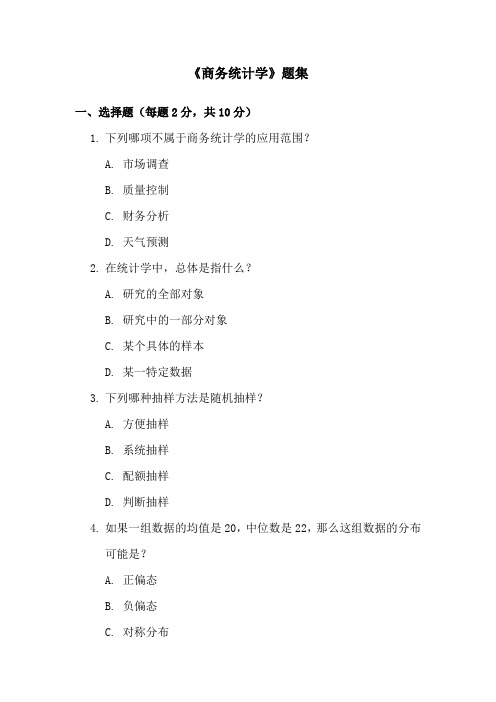
《商务统计学》题集一、选择题(每题2分,共10分)1.下列哪项不属于商务统计学的应用范围?A. 市场调查B. 质量控制C. 财务分析D. 天气预测2.在统计学中,总体是指什么?A. 研究的全部对象B. 研究中的一部分对象C. 某个具体的样本D. 某一特定数据3.下列哪种抽样方法是随机抽样?A. 方便抽样B. 系统抽样C. 配额抽样D. 判断抽样4.如果一组数据的均值是20,中位数是22,那么这组数据的分布可能是?A. 正偏态B. 负偏态C. 对称分布D. 无法确定5.在回归分析中,解释变量和被解释变量分别是什么?A. 因变量和自变量B. 自变量和因变量C. 都是自变量D. 都是因变量二、填空题(每空1分,共10分)1.在统计学中,用来衡量数据分布集中趋势的指标有______、______和______。
2.若一组数据的四分位数Q1=10,Q2=20,Q3=30,则该组数据的中位数为______。
3.在假设检验中,如果P值小于显著性水平α,则我们______原假设。
4.统计表中,频数和频率分别表示数据的______和______。
5.在回归分析中,回归系数的经济意义是解释变量每增加一个单位,被解释变量平均增加______单位。
三、判断题(每题1分,共10分)1.统计学的目的是收集、整理、分析和解释数据,从而帮助人们做出决策。
( )2.在正态分布中,均值、中位数和众数三者相等。
( )3.标准差是衡量数据波动大小的一个重要指标,标准差越大,说明数据的波动越大。
( )4.在假设检验中,如果P值大于显著性水平α,则我们有足够的证据拒绝原假设。
( )5.相关系数r的取值范围是[-1, 1],r=1表示完全正相关,r=-1表示完全负相关。
( )6.如果一组数据的偏度系数大于0,则说明这组数据是正偏态分布。
( )7.在抽样调查中,样本容量越大,抽样误差就越小。
( )8.统计推断是通过样本数据来推断总体的特征。
( )9.移动平均法是一种常用的时间序列预测方法。

商务经济统计试题及答案一、单项选择题1. 商务统计中,用于描述数据集中趋势的指标是:A. 方差B. 标准差C. 平均数D. 众数答案:C2. 在商务经济统计中,下列哪项不是统计量?A. 均值B. 标准差C. 样本容量D. 极差答案:C3. 以下哪项不是时间序列分析的类型?A. 季节性分析B. 趋势分析C. 相关性分析D. 循环分析答案:C二、多项选择题1. 商务统计中,以下哪些因素会影响数据的变异性?A. 数据的分布形态B. 数据的集中趋势C. 数据的离散程度D. 数据的样本大小答案:A、C2. 在进行商务经济预测时,常用的统计方法包括:A. 回归分析B. 指数平滑法C. 移动平均法D. 季节性调整答案:A、B、C三、简答题1. 简述商务统计中的指数平滑法的基本原理。
答案:指数平滑法是一种时间序列预测方法,它通过对历史数据加权平均来预测未来值。
权重随着时间的递减而递减,即近期的数据比远期的数据在预测中占有更大的权重。
这种方法可以平滑掉数据中的随机波动,从而更好地反映数据的趋势。
2. 描述商务统计中相关系数的计算方法及其意义。
答案:相关系数是用来衡量两个变量之间线性关系强度和方向的统计量。
其计算公式为:\[ r = \frac{\sum (X_i - \bar{X})(Y_i -\bar{Y})}{\sqrt{\sum (X_i - \bar{X})^2 \sum (Y_i -\bar{Y})^2}} \] 其中,\( X_i \) 和 \( Y_i \) 分别是两个变量的观测值,\( \bar{X} \) 和 \( \bar{Y} \) 是它们的平均值。
相关系数的值介于-1和1之间,值越接近1或-1表示变量间的线性关系越强,正值表示正相关,负值表示负相关。
四、计算题1. 假设有一组商务数据,其平均值为100,标准差为15。
如果某次测量结果为120,计算该结果的Z分数。
答案:Z分数的计算公式为:\[ Z = \frac{(X - \mu)}{\sigma} \]其中,\( X \) 是测量结果,\( \mu \) 是平均值,\( \sigma \) 是标准差。

精选全文完整版(可编辑修改)《商务统计》试题5------------------------------------------------------------------------------------------------------------------------一、判断题(每题1分,共10分)1.应用切比雪夫定理估计与平均数的距离在z个标准差之内的数据项所占比例时,z的取值可以是任意正数( )。
2.条形图和直方图都可以用于描述分类数据的频数分布、相对频数分布或百分比频数分布( )。
3.在样本容量一定的情况下,为了确保更高的置信度,置信区间的宽度必须变大( )。
4.事件A与其补A c是互斥的( )。
5.无论是单侧检验还是双侧检验,如果p值≤α,则拒绝原假设H0( )。
6.对于简单随机样本,样本均值x̅的数学期望、标准差受到样本容量n的影响 ( )。
7.在联列表中,两个变量必须都是分类变量或者都是数值型变量( )。
8.当分类数据用数值表示时,可以进行有意义的算术运算( )。
9.在满足一定条件时,可以用正态分布近似计算二项分布 ( )。
10.方差分析仅能用于实验性研究得到的数据而不能用于观测性研究得到的数据( )。
二、单项选择题(每题2分,共30分)1.由于改变生产方法所需的时间和成本都很大,所以在一种新方法实施之前,制造负责人必须使管理人员确信,推荐的制造方法能降低成本。
目前生产方法的平均成本是每小时22美元。
一项调研工作是在样本生产期同,测量新方法的成本。
以下假设合适的是( )。
A. H0:μ≥22 H a:μ<22B.H0:μ≤22 H a:μ>22C.H0:μ>22 H a:μ≤22D.H0:μ<22 H a:μ≥222.以下关于众数的说法错误的是( )。
A.众数是数据集中出现频率最高的数据值B.众数仅适用于数值型数据C.众数是一种位置度量指标D.众数有可能存在两个或更多3.以下关于事件的概率说法错误的是( )。

商务统计试题及答案### 商务统计试题及答案#### 一、选择题1. 统计数据收集的方法不包括以下哪项?- A. 观察法- B. 实验法- C. 调查法- D. 假设法答案:D2. 以下哪项不是描述性统计分析的内容?- A. 数据的分类- B. 数据的汇总- C. 数据的推断- D. 数据的图表展示答案:C3. 在统计学中,中位数是指:- A. 数据集中出现次数最多的数值- B. 数据集的算术平均值- C. 将数据集从小到大排列后位于中间位置的数值 - D. 所有数据的和除以数据的个数答案:C#### 二、简答题1. 解释什么是标准差,并简述其在商务统计中的重要性。
标准差是衡量一组数据离散程度的统计量,它表示数据集中的数值与平均值的偏差平方的平均数的平方根。
在商务统计中,标准差用于评估数据的波动性,帮助决策者了解业务风险和市场波动。
2. 描述相关系数的概念及其在商务分析中的应用。
相关系数是度量两个变量之间线性关系强度和方向的统计指标。
在商务分析中,相关系数可以用来评估不同因素对业务结果的影响,例如,销售额与广告支出之间的关系。
#### 三、计算题1. 给定以下数据集:10, 12, 15, 20, 25, 请计算平均值、中位数和标准差。
- 平均值 = (10 + 12 + 15 + 20 + 25) / 5 = 18- 中位数 = 15(数据集从小到大排列后位于中间位置的数值)- 标准差= √[(Σ(xi - 平均值)²) / n] = √[(10 - 18)² + (12 - 18)² + ... + (25 - 18)²] / 5 ≈ 5.392. 假设某公司连续5个月的销售额分别为:30万、35万、40万、45万和50万。
计算这5个月的平均销售额和销售额的增长趋势。
- 平均销售额 = (30 + 35 + 40 + 45 + 50) / 5 = 40万- 销售额的增长趋势可以通过计算每月销售额的增长率来分析,例如,从第一个月到第二个月的增长率为 (35 - 30) / 30 * 100% = 16.67%。
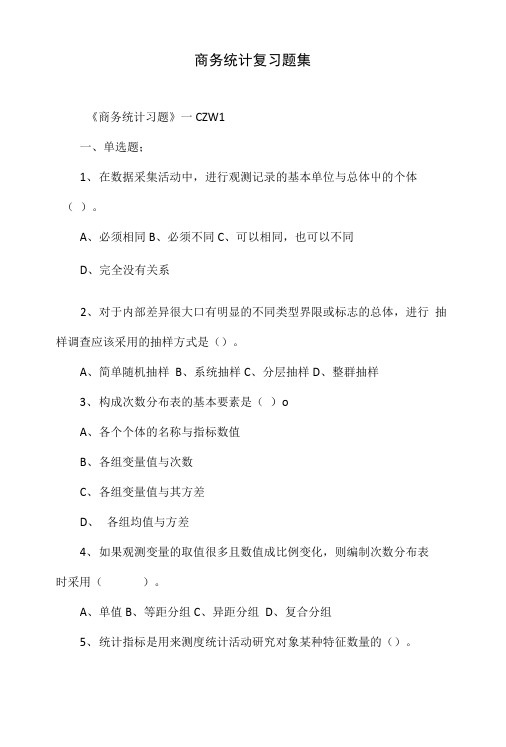
商务统计复习题集《商务统计习题》一CZW1一、单选题;1、在数据采集活动中,进行观测记录的基本单位与总体屮的个体()。
A、必须相同B、必须不同C、可以相同,也可以不同D、完全没有关系2、对于内部差异很大口有明显的不同类型界限或标志的总体,进行抽样调查应该采用的抽样方式是()。
A、简单随机抽样B、系统抽样C、分层抽样D、整群抽样3、构成次数分布表的基本要素是()oA、各个个体的名称与指标数值B、各组变量值与次数C、各组变量值与其方差D、各组均值与方差4、如果观测变量的取值很多且数值成比例变化,则编制次数分布表时采用()。
A、单值B、等距分组C、异距分组D、复合分组5、统计指标是用来测度统计活动研究对象某种特征数量的()。
《商务统计习题》一czw2A、概念B、数值C、概念和数值D、数值尺度6、统计指标口径是指统计指标所包括的()。
A、总体大小B、个体多少C、理论范围D、具体范围7、统计推断是一种()。
A、演绎推理B、完全归纳推理C、不完全归纳推理D、非逻辑推理。
8、根据斯特吉斯公式,对于样本容量为1000的一个观测样本,采用等距分组,英组数应该为()。
A、9 组B、10 组C、11 组D、12 组9、从0-1分布总体屮进行不放回抽样,样本屮具有1值的个体数服从()。
A、两点分布B、二项分布C、超几何分布D、泊松分布10、对于由观测变量的各个分组和各组变量总值顺序排列的分组分布表,计算算术平均数需采用的计算公式为()0A、简单算术平均数B、加权算术平均数C、简单调和平均数D、加权调和平均数口、随机变量的观测值中出现次数最多的变量值是该变量的()oA、众数B、中位数C、极值D、均值12、两个观测值之间如果存在同方向的线性函数关系,则二者的相关关系为()。
A、0B、1C、-1D、0.5)o15、变量x 和y 的相关系数的符号,取决于()。
A 、正态分布B 、x 分布C 、t 分布D 、均匀分布2 18、抽样分布是指( )oA 、抽取样本的总体分布B 、样本自身的分布C 、样本统计量的分布D 、抽样观测变量的分布 估计量是一个( )。
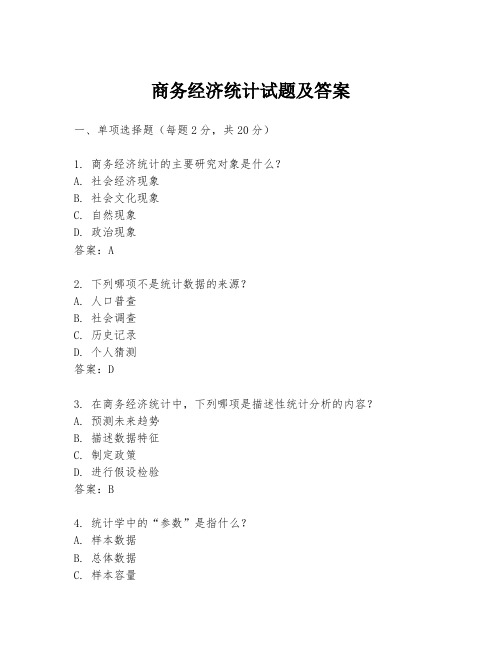
商务经济统计试题及答案一、单项选择题(每题2分,共20分)1. 商务经济统计的主要研究对象是什么?A. 社会经济现象B. 社会文化现象C. 自然现象D. 政治现象答案:A2. 下列哪项不是统计数据的来源?A. 人口普查B. 社会调查C. 历史记录D. 个人猜测答案:D3. 在商务经济统计中,下列哪项是描述性统计分析的内容?A. 预测未来趋势B. 描述数据特征C. 制定政策D. 进行假设检验答案:B4. 统计学中的“参数”是指什么?A. 样本数据B. 总体数据C. 样本容量D. 总体数量答案:B5. 以下哪个概念不是概率论的基本概念?A. 随机事件B. 概率C. 总体D. 样本答案:C6. 商务经济统计中,平均数通常用来衡量数据的什么?A. 集中趋势B. 离散程度C. 偏态分布D. 正态分布答案:A7. 在统计学中,标准差是用来衡量什么的?A. 集中趋势B. 离散程度C. 平均值D. 偏态分布答案:B8. 下列哪项是统计学中用于描述数据分布形状的指标?A. 平均数B. 标准差C. 众数D. 方差答案:C9. 在商务经济统计中,相关系数的取值范围是多少?A. -1到1B. 0到1C. 1到10D. -10到10答案:A10. 以下哪种图表最适合展示时间序列数据?A. 条形图B. 饼图C. 折线图D. 散点图答案:C二、多项选择题(每题3分,共15分)1. 商务经济统计中常用的数据收集方法包括哪些?A. 问卷调查B. 观察法C. 实验法D. 抽样调查答案:ABD2. 下列哪些是描述数据集中趋势的统计量?A. 平均数B. 中位数C. 众数D. 方差答案:ABC3. 在商务经济统计中,下列哪些因素会影响数据的代表性?A. 样本容量B. 抽样方法C. 样本误差D. 总体大小答案:AB4. 统计学中,下列哪些方法可以用来检验假设?A. t检验B. 卡方检验C. 回归分析D. 方差分析答案:ABD5. 在商务经济统计中,下列哪些图表可以用来展示数据的分布?A. 条形图B. 直方图C. 箱线图D. 散点图答案:ABC三、简答题(每题5分,共20分)1. 简述商务经济统计在企业决策中的作用。
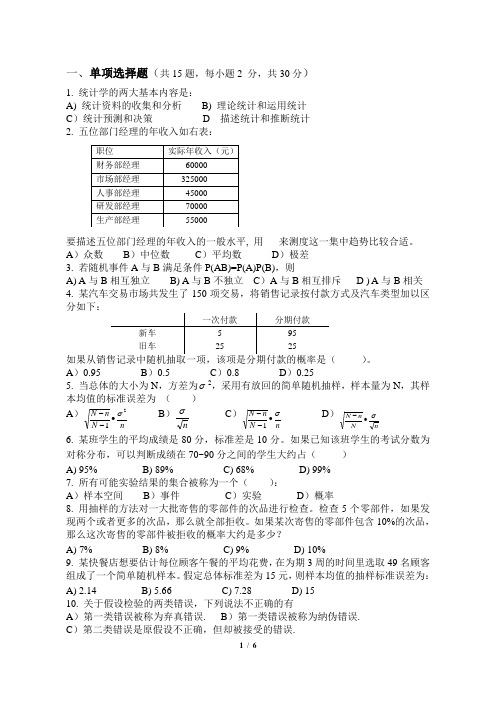
一、单项选择题(共15题,每小题2 分,共30分)1. 统计学的两大基本内容是:A) 统计资料的收集和分析 B) 理论统计和运用统计 C )统计预测和决策 D 描述统计和推断统计 2. 五位部门经理的年收入如右表:要描述五位部门经理的年收入的一般水平, 用___来测度这一集中趋势比较合适。
A )众数B )中位数C )平均数D )极差 3. 若随机事件A 与B 满足条件P(AB)=P(A)P(B),则A) A 与B 相互独立 B) A 与B 不独立 C )A 与B 相互排斥 D ) A 与B 相关 4. 某汽车交易市场共发生了150项交易,将销售记录按付款方式及汽车类型加以区分如下:)。
A )0.95 B )0.5 C )0.8 D )0.255. 当总体的大小为N ,方差为σ2,采用有放回的简单随机抽样,样本量为N ,其样本均值的标准误差为 ( )A )nN n N 21σ•-- B )nσ C )nN n N σ•--1 D )nNn N σ•-6. 某班学生的平均成绩是80分,标准差是10分。
如果已知该班学生的考试分数为对称分布,可以判断成绩在70~90分之间的学生大约占( ) A) 95% B) 89% C) 68% D) 99%7. 所有可能实验结果的集合被称为一个( ):A )样本空间B )事件C )实验D )概率8. 用抽样的方法对一大批寄售的零部件的次品进行检查。
检查5个零部件,如果发现两个或者更多的次品,那么就全部拒收。
如果某次寄售的零部件包含10%的次品, 那么这次寄售的零部件被拒收的概率大约是多少?A) 7% B) 8% C) 9% D) 10% 9. 某快餐店想要估计每位顾客午餐的平均花费,在为期3周的时间里选取49名顾客组成了一个简单随机样本。
假定总体标准差为15元,则样本均值的抽样标准误差为: A) 2.14 B) 5.66 C) 7.28 D) 15 10. 关于假设检验的两类错误,下列说法不正确的有A )第一类错误被称为弃真错误.B )第一类错误被称为纳伪错误.C )第二类错误是原假设不正确,但却被接受的错误.D )第一类错误是原假设正确,但却被拒绝的错误.11. 假设检验中,00:μμ≥H ,01:μμ<H ,N 为大样本,统计量Z=x μσ-,05.0=α,拒绝域为:A) Z<-1.96 B) Z>1.96 C) Z>1.65 D) Z<-1.65 12. 关于F 分布的说法,哪个是正确的?A) F 0.05,10,20 = 1/F 0.95,10,20 B) F 0.05,10,20 = 1/F 0.05,20,10 C) F 0.95,10,20 = 1/F 0.95,20,10 D) F 0.95,10,20 = 1/F 0.05,20,1013. 采取随机抽样抽取1000人,其中有450人支持候选人A ,那么支持候选人A 的置信度为95%的置信区间为:A) (1.645,1.96). B) (0.40,0.50). C) (0.45,0.55). D) (0.419,0.481). 14. 在方差分析中,检验统计量F 是( )。

商务统计试题及答案一、单项选择题(每题2分,共20分)1. 商务统计中,数据的收集方法不包括以下哪一项?A. 观察法B. 实验法C. 调查法D. 推算法答案:D2. 在统计学中,总体是指:A. 研究对象的全体B. 研究对象的一部分C. 研究对象的个体D. 研究对象的样本答案:A3. 下列哪个选项不是描述数据集中趋势的统计量?A. 平均数B. 中位数C. 方差D. 众数答案:C4. 在商务统计中,相关系数的取值范围是:A. -1到1之间B. 0到1之间C. 1到10之间D. 任何实数答案:A5. 以下哪种图表最适合展示时间序列数据的变化趋势?A. 条形图B. 饼图C. 折线图D. 散点图答案:C6. 假设检验的目的是:A. 确定总体参数B. 估计总体参数C. 验证样本数据D. 验证总体参数答案:D7. 在回归分析中,自变量和因变量之间的关系是:A. 正相关B. 负相关C. 无关D. 线性关系答案:D8. 下列哪个选项不是统计分析中常见的数据类型?A. 定类数据B. 定序数据C. 定距数据D. 定性数据答案:D9. 标准差是衡量数据离散程度的统计量,其计算公式为:A. 平均数的平方B. 平均数的平方根C. 方差的平方根D. 方差的倒数答案:C10. 以下哪个统计量用于衡量数据的偏态?A. 均值B. 方差C. 偏度D. 峰度答案:C二、多项选择题(每题3分,共15分)1. 下列哪些是商务统计中常用的数据收集方法?A. 观察法B. 实验法C. 调查法D. 推算法答案:ABC2. 在商务统计中,描述数据集中趋势的统计量包括:A. 平均数B. 中位数C. 方差D. 众数答案:ABD3. 以下哪些是描述数据离散程度的统计量?A. 标准差B. 方差C. 偏度D. 峰度答案:AB4. 在统计学中,总体参数和样本统计量的区别在于:A. 总体参数是固定的B. 样本统计量是估计值C. 总体参数是估计值D. 样本统计量是固定的答案:AB5. 下列哪些是商务统计中常见的数据类型?A. 定类数据B. 定序数据C. 定距数据D. 定性数据答案:ABC三、判断题(每题2分,共10分)1. 商务统计中,数据收集的方法只有调查法和观察法。

商务统计期末试题及答案【注意:以下为示例文章格式,实际内容与题目无关】一、选择题(每题2分,共30分)1. 下面哪个选项是正确的?A. 1+1=2B. 1+1=3C. 1+1=4D. 1+1=5答案:A2. 给定数据集的平均值为5,标准差为2,那么方差为多少?A. 1B. 2C. 4D. 8答案:C二、判断题(每题2分,共20分)1. 描述性统计是通过样本数据推断总体特征的方法。
答案:正确2. 概率分布函数可以描述随机变量的所有可能取值的概率。
答案:正确三、计算题1. 一个班级有30名学生,其中男生有20名,女生有10名。
请计算男生人数占总人数的比例,并将结果四舍五入到小数点后两位。
答案:20 / 30 = 0.67,四舍五入为 0.672. 有一个餐厅,星期一到星期五的销售额分别为1000、1500、1200、800、2000元,请计算平均销售额。
答案:(1000 + 1500 + 1200 + 800 + 2000) / 5 = 1100元3. 一家公司销售了3种产品,产品A的销售额占总销售额的30%,产品B的销售额占总销售额的40%,产品C的销售额为2000元,求总销售额。
答案:产品C的销售额占总销售额的30% + 40% = 70%,则总销售额为2000元 / 70% = 2857.14元四、应用题某公司进行了一次市场调研,调查了1000名顾客的购买行为。
以下是调查结果:- 500人购买了产品A- 300人购买了产品B- 200人购买了产品C- 100人购买了产品A和产品B- 50人购买了产品B和产品C- 20人购买了产品A和产品C- 10人购买了三种产品请回答以下问题:1. 购买了产品A但未购买产品B的顾客有多少人?答案:购买了产品A的人数减去购买了产品A和产品B的人数:500 - 100 = 400人2. 购买了产品B且同时购买了产品C的顾客有多少人?答案:购买了产品B和产品C的人数:50人3. 购买了至少一种产品的顾客有多少人?答案:购买了产品A、B或C的人数加上购买了三种产品的人数:500 + 300 + 200 - 10 = 990人五、简答题1. 请解释什么是样本调查?答:样本调查是从总体中选取一部分样本,并对这些样本进行调查和研究,通过对样本的观察和分析来推断总体的特征和规律。
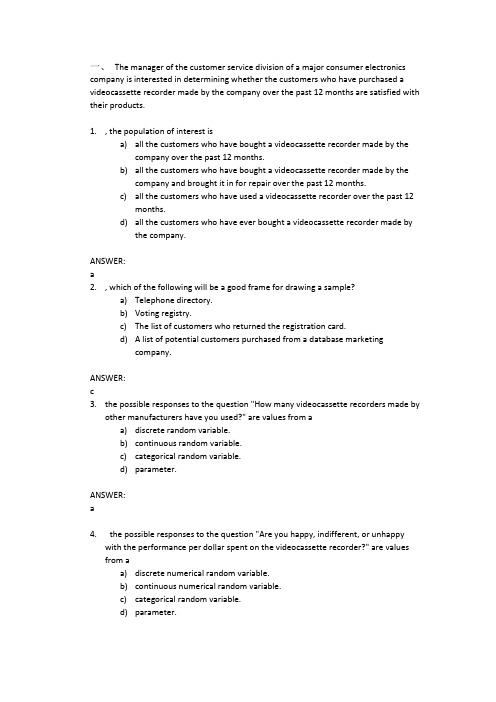
一、The manager of the customer service division of a major consumer electronics company is interested in determining whether the customers who have purchased a videocassette recorder made by the company over the past 12 months are satisfied with their products.1., the population of interest isa)all the customers who have bought a videocassette recorder made by thecompany over the past 12 months.b)all the customers who have bought a videocassette recorder made by thecompany and brought it in for repair over the past 12 months.c)all the customers who have used a videocassette recorder over the past 12months.d)all the customers who have ever bought a videocassette recorder made bythe company.ANSWER:a2., which of the following will be a good frame for drawing a sample?a)Telephone directory.b)Voting registry.c)The list of customers who returned the registration card.d) A list of potential customers purchased from a database marketingcompany.ANSWER:c3.the possible responses to the question "How many videocassette recorders made byother manufacturers have you used?" are values from aa)discrete random variable.b)continuous random variable.c)categorical random variable.d)parameter.ANSWER:a4.the possible responses to the question "Are you happy, indifferent, or unhappywith the performance per dollar spent on the videocassette recorder?" are values from aa)discrete numerical random variable.b)continuous numerical random variable.c)categorical random variable.d)parameter.ANSWER:cTYPE: MC DIFFICULTY: EasyKEYWORDS: categorical random variable, types of data5.the possible responses to the question "What is your annual income rounded to thenearest thousands?" are values from aa)discrete numerical random variable.b)continuous numerical random variable.c)categorical random variable.d)parameter.ANSWER:a6.the possible responses to the question "How much time do you use thevideocassette recorder every week on the average?" are values from aa)discrete numerical random variable.b)continuous numerical random variable.c)categorical random variable.d)parameter.ANSWER:b7.the possible responses to the question "How many people are there in yourhousehold?" are values from aa)discrete numerical random variable.b)continuous numerical random variable.c)categorical random variable.d)parameter.ANSWER:a8.the possible responses to the question "How would you rate the quality of yourpurchase experience with 1 = excellent, 2 = good, 3 = decent, 4 = poor, 5 = terrible?"are values from aa)discrete numerical random variable.b)continuous numerical random variable.c)categorical random variable.d)parameter.ANSWER: c9.the possible responses to the question "What brand of videocassette recorder didyou purchase?" are values from aa)discrete numerical random variable.b)continuous numerical random variable.c)categorical random variable.d)parameter.ANSWER:c10.the possible responses to the question "Out of a 100 point score with 100 being thehighest and 0 being the lowest, what is your satisfaction level on the videocassetterecorder that you purchased?" are values from aa)discrete numerical random variable.b)continuous numerical random variable.c)categorical random variable.d)parameter.ANSWER:a11.the possible responses to the question "In which year were you born?" are valuesfrom aa)discrete numerical random variable.b)continuous numerical random variable.c)categorical random variable.d)parameter.ANSWER:a二、The chancellor of a major university was concerned about alcohol abuse on her campus and wanted to find out the proportion of students at her university who visited campus bars on the weekend before the final exam week. Her assistant took a random sample of 250 students. The total number of students in the sample who visited campus bars on the weekend before the final exam week is an example ofe) a categorical random variable.f) a discrete random variable.g) a continuous random variable.h) a parameter.ANSWER:b三、T he chancellor of a major university was concerned about alcohol abuse on her campusand wanted to find out the proportion of students at her university who visited campus bars on the weekend before the final exam week. Her assistant took a randomsample of 250 students and computed the portion of students in the sample whovisited campus bars on the weekend before the final exam. The portion of allstudents at her university who visited campus bars on the weekend before the final exam week is an example ofi) a categorical random variable.j) a discrete random variable.k) a continuous random variable.l) a parameter.ANSWER:d四、T he chancellor of a major university was concerned about alcohol abuse on her campusand wanted to find out the proportion of students at her university who visited campus bars on the weekend before the final exam week. Her assistant took a randomsample of 250 students. The portion of students in the sample who visited campus bars on the weekend before the final exam week is an example of __________.m)a categorical random variable.n) a discrete random variable.o) a parameter.p) a statisticANSWER:d五、The ordered array below resulted from taking a sample of 25 batches of 500 computer chips and determining how many in each batch were defective.Defects1 2 4 4 5 5 6 7 9 9 12 12 1517 20 21 23 23 25 26 27 27 28 29 291.Referring to Table 2-11, if a frequency distribution for the defects data isconstructed, u sing "0 but less than 5" as the first class, the frequency of the “20 but less than 25” class would be ________.ANSWER:42.Referring to Table 2-11, if a frequency distribution for the defects data isconstructed, using "0 but less than 5" as the first class, the relative frequency of the “15 but less than 20” class would be ________.ANSWER:0.08 or 8% or 2/253.Referring to Table 2-11, construct a frequency distribution for the defects data,using "0 but less than 5" as the first class.ANSWER:Defects Frequency0 but less than 5 45 but less than 10 610 but less than 15 215 but less than 20 220 but less than 25 425 but less than 30 74.Referring to Table 2-11, construct a relative frequency or percentage distribution forthe defects data, using "0 but less than 5" as the first class.ANSWER:Defects Percentage0 but less than 5 165 but less than 10 2410 but less than 15 815 but less than 20 820 but less than 25 1625 but less than 30 285.Referring to Table 2-11, construct a cumulative percentage distribution for thedefects data if the corresponding frequency distribution uses "0 but less than 5" as the first class.ANSWER:Defects CumPct0 05 1610 4015 4820 5625 7230 1006.Referring to Table 2-11, construct a histogram for the defects data, using "0 but lessthan 5" as the first class.ANSWER:7. Referring to Table 2-11, construct a cumulative percentage polygon for the defectsdata if the corresponding frequency distribution uses "0 but less than 5" as the firstclass.ANSWER:Cumulative Percentage Polygon0%10%20%30%40%50%60%70%80%90%100%0510********Number of Defects六、Health care issues are receiving much attention in both academic and political arenas. A sociologist recently conducted a survey of citizens over 60 years of age whose net worth is too high to qualify for Medicaid and have no private health insurance. The ages of 25 uninsured senior citizens were as follows:60 61 62 63 64 65 66 68 68 69 70 73 7374 75 76 76 81 81 82 86 87 89 90 921. Referring to Table 3-1, calculate the arithmetic mean age of the uninsured seniorcitizens to the nearest hundredth of a year.ANSWER:74.04 years2.Referring to Table 3-1, identify the median age of the uninsured senior citizens.ANSWER:73 years3.Referring to Table 3-1, identify the first quartile of the ages of the uninsured seniorcitizens.ANSWER:65.5 years4.Referring to Table 3-1, identify the third quartile of the ages of the uninsured seniorcitizens.ANSWER:81.5 years5.Referring to Table 3-1, identify the interquartile range of the ages of the uninsuredsenior citizens.ANSWER:16 years6.Referring to Table 3-1, identify which of the following is the correct statement.a)One fourth of the senior citizens sampled are below 65.5 years of age.b)The middle 50% of the senior citizens sampled are between 65.5 and 73.0years of age.c)The average age of senior citizens sampled is 73.5 years of age.d)All of the above are correct.ANSWER:a7.Referring to Table 3-1, identify which of the following is the correct statement.a)One fourth of the senior citizens sampled are below 64 years of age.b)The middle 50% of the senior citizens sampled are between 65.5 and 73.0years of age.c)25% of the senior citizens sampled are older than 81.5 years of age.d)All of the above are correct.ANSWER:c8.Referring to Table 3-1, what type of shape does the distribution of the sampleappear to have?ANSWER:Slightly positive or right-skewed.9.Referring to Table 3-1, calculate the variance of the ages of the uninsured seniorcitizens correct to the nearest hundredth of a year squared.ANSWER:94.96 years210.Referring to Table 3-1, calculate the standard deviation of the ages of the uninsuredsenior citizens correct to the nearest hundredth of a year.ANSWER:9.74 years11.Referring to Table 3-1, calculate the coefficient of variation of the ages of theuninsured senior citizens.ANSWER:13.16%七、The stem-and-leaf display below represents the number of cargo manifests approved by customs inspectors of the Port of New York in a sample of 35 days.STEM LEAVES1H 678892L 00111222233334442H 55666788993L 1122Note (1): 1H means the “high teens” 15, 16, 17, 18, or 19; 2L means the “lowtwenties” 20, 21, 22, 23, or 24; 2H means the “high twenties” 25, 26, 27, 28, or 29, etc.Note (2): For this sample, the sum of the observations is 838, the sum of the squares of the observations is 20,684, and the sum of the squared differences between eachobservation and the mean is 619.89.1.Referring to Table 3-4, the arithmetic mean of the customs data is ________.ANSWER:23.92.Referring to Table 3-4, the median of the customs data is ________.ANSWER:233.Referring to Table 3-4, the first quartile of the customs data is ________.ANSWER:214.Referring to Table 3-4, the third quartile of the customs data is ________.ANSWER:275.Referring to Table 3-4, the range of the customs data is ________.ANSWER:166.Referring to Table 3-4, the interquartile range of the customs data is ________.ANSWER:67.Referring to Table 3-4, the variance of the customs data is ________.ANSWER:18.28.Referring to Table 3-4, the standard deviation of the customs data is ________.ANSWER:4.39.Referring to Table 3-4, the coefficient of variation of the customs data is ________percent.ANSWER:17.8% or 18%10.Referring to Table 3-4, the five-number summary for the data in the customssample consists of ________, ________, ________, ________, ________.ANSWER:16, 21, 23, 27, 3211.Referring to Table 3-4, construct a boxplot of this sample.Box-and-whisker Plot101520253035ANSWER:八、Times spent studying by students in the week before final exams follow a normaldistribution with standard deviation 8 hours. A random sample of 4 students was taken in order to estimate the mean study time for the population of all students.1.what is the probability that the sample mean exceeds the population mean by morethan 2 hours?ANSWER:0.30852.what is the probability that the sample mean is more than 3 hours below thepopulation mean?ANSWER:0.22663.what is the probability that the sample mean differs from the population mean byless than 2 hours?ANSWER:0.3829 using Excel or 0.3830 using Table E.24.what is the probability that the sample mean differs from the population mean bymore than 3 hours?ANSWER:0.4533 using Excel or 0.4532 using Table E.2九、A quality control engineer is interested in the mean length of sheet insulation being cutautomatically by machine. The desired length of the insulation is 12 feet. It is known that thestandard deviation in the cutting length is 0.15 feet. A sample of 70 cut sheets yields a mean length of 12.14 feet. This sample will be used to obtain a 99% confidence interval for the mean length cut by machine.1.Referring to Table 8-3, the critical value to use in obtaining the confidence interval is________.ANSWER:2.582.Referring to Table 8-3, the confidence interval goes from ________ to ________.ANSWER:12.09 to 12.193.True or False: Referring to Table 8-3, the confidence interval indicates that themachine is not working properly.ANSWER:True4.True or False: Referring to Table 8-3, the confidence interval is valid only if thelengths cut are normally distributed.ANSWER:FalseEXPLANATION: With a sample size of 70, this confidence interval will still be valid if the lengths cut are not normally distributed due to the central limit theorem.KEYWORDS: confidence interval, mean, standardized normal distribution, central limit theorem5.Referring to Table 8-3, suppose the engineer had decided to estimate the meanlength to within 0.03 with 99% confidence. Then the sample size would be________.ANSWER:165.8724 rounds up to 166十、A manager of the credit department for an oil company would like to determine whether the average monthly balance of credit card holders is equal to $75. An auditor selects a random sample of 100 accounts and finds that the average owed is $83.40 with a sample standard deviation of $23.65. If you were to conduct a test to determine whether the auditor should conclude that there is evidence that the average balance is different from $75, which test would you use?a)Z-test of a population meanb)Z-test of a population proportionc)t-test of population meand)t-test of a population proportionANSWER:c十一、A manager of the credit department for an oil company would like to determine whether the average monthly balance of credit card holders is equal to $75. An auditor selects a random sample of 100 accounts and finds that the average owed is $83.40 with a sample standard deviation of $23.65. If you wanted to test whether the average balance is different from $75 and decided to reject the null hypothesis, what conclusion could you draw?e)There is not evidence that the average balance is $75.f)There is not evidence that the average balance is not $75.g)There is evidence that the average balance is $75.h)There is evidence that the average balance is not $75.ANSWER:d十二、The marketing manager for an automobile manufacturer is interested in determining the proportion of new compact-car owners who would have purchased a passenger-side inflatable air bag if it had been available for an additional cost of $300. The manager believes from previous information that the proportion is 0.30. Suppose that a survey of 200 new compact-car owners is selected and 79 indicate that they would have purchased the inflatable air bags. If you were to conduct a test to determine whether there is evidence that the proportion is different from 0.30, which test would you use?i)Z-test of a population meanj)Z-test of a population proportionk)t-test of population meanl)t-test of a population proportionANSWER:b十三、A student claims that he can correctly identify whether a person is a business major or an agriculture major by the way the person dresses. Suppose in actuality that if someone is a business major, he can correctly identify that person as a business major 87% of the time. When a person is an agriculture major, the student will incorrectly identify that person as a business major 16% of the time. Presented with one person and asked to identify the major of this person (who is either a business or agriculture major), he considers this to be a hypothesis test with the null hypothesis being that the person is a business major and the alternative that the person is an agriculture major.2.Referring to Table 9-2, what would be a Type I error?a)Saying that the person is a business major when in fact the person is abusiness major.b)Saying that the person is a business major when in fact the person is anagriculture major.c)Saying that the person is an agriculture major when in fact the person is abusiness major.d)Saying that the person is an agriculture major when in fact the person is anagriculture major.ANSWER:c3.Referring to Table 9-2, what would be a Type II error?a)Saying that the person is a business major when in fact the person is abusiness major.b)Saying that the person is a business major when in fact the person is anagriculture major.c)Saying that the person is an agriculture major when in fact the person is abusiness major.d)Saying that the person is an agriculture major when in fact the person is anagriculture major.ANSWER:b4.Referring to Table 9-2, what is the “actual level of significance” of the test?a)0.13b)0.16c)0.84d)0.87ANSWER:a5.Referring to Table 9-2, what is the “actual confidence coefficient”?a)0.13b)0.16c)0.84d)0.87ANSWER:d6.Referring to Table 9-2, what is the value of ?a)0.13b)0.16c)0.84d)0.87ANSWER:a7.Referring to Table 9-2, what is the value of β?a)0.13b)0.16c)0.84d)0.87ANSWER:b十四、Are Japanese managers more motivated than American managers? A randomly selected group of each were administered the Sarnoff Survey of Attitudes Toward Life (SSATL), which measures motivation for upward mobility. The SSATL scores are summarized below.American JapaneseSample Size211100Mean SSATL Score65.7579.83Population Std. Dev.11.07 6.411.Referring to Table 10-1, judging from the way the data were collected, which testwould likely be most appropriate to employ?a)Paired t testb)Pooled-variance t test for the difference between two meansc)Independent samples Z test for the difference between two meansd)Related samples Z test for the mean differenceANSWER:c2.Referring to Table 10-1, give the null and alternative hypotheses to determine if theaverage SSATL score of Japanese managers differs from the average SSATL score of American managers.a)H0: μA–μJ≥0 ver sus H1: μA–μJ<0b)H0:μA–μJ≤0 ver sus H1: μA–μJ>0c)H0: μA–μJ=0 ver sus H1:μA–μJ≠0d)H0:X A–X J=0 versus H1:X A–X J≠0ANSWER: c3. Referring to Table 10-1, assuming the independent samples procedure was used,calculate the value of the test statistic.a) Z =65.75–79.839.82211+9.82100b) Z =65.75–79.8311.07211+6.41100c) Z =65.75–79.839.822211+9.822100d) Z =65.75–79.8311.072211+6.412100ANSWER:d4. Referring to Table 10-1, suppose that the test statistic is Z = 2.45. Find the p -value ifwe assume that the alternative hypothesis was a two-tailed test(0– :1≠J A H μμ).a) 0.0071 b) 0.0142 c) 0.4929 d)0.9858ANSWER: b十五、An airline wants to select a computer software package for its reservation system. Four software packages (1, 2, 3, and 4) are commercially available. The airline will choose the package that bumps as few passengers, on the average, as possible during a month. An experiment is set up in which each package is used to make reservations for 5 randomly selected weeks. (A total of 20 weeks was included in the experiment.) The number of passengers bumped each week is obtained, which gives rise to the following Excel output:ANOVASource of Variation SS df MS F P-value F crit Between Groups212.438.3049850.001474 3.238867 Within Groups136.48.525Total348.8????1.Referring to Table 10-15, the within groups degrees of freedom ise)3f)4g)16h)19ANSWER:c2.Referring to Table 10-15, the total degrees of freedom isi)3j)4k)16l)19ANSWER:d3.Referring to Table 10-15, the among-group (between-group) mean squares ism)8.525n)70.8o)212.4p)637.2ANSWER:b4.Referring to Table 10-15, at a significance level of 1%,q)there is insufficient evidence to conclude that the average numbers ofcustomers bumped by the 4 packages are not all the same.r)there is insufficient evidence to conclude that the average numbers ofcustomers bumped by the 4 packages are all the same.s)there is sufficient evidence to conclude that the average numbers ofcustomers bumped by the 4 packages are not all the same.t)there is sufficient evidence to conclude that the average numbers ofcustomers bumped by the 4 packages are all the same.ANSWER:c十六、A study published in the American Journal of Public Health was conducted to determine whether the use of seat belts in motor vehicles depends on ethnic status in San Diego County. A sample of 792 children treated for injuries sustained from motor vehicle accidents was obtained, and each child was classified according to (1) ethnic status (Hispanic or non-Hispanic) and (2) seat belt usage (worn or not worn) during the accident. The number of children in each category is given in the table below.1.Referring to Table 11-1, the calculated test statistic isa)-0.9991b)-0.1368c)48.1849d)72.8063ANSWER:c2.Referring to Table 11-1, at 5% level of significance, the critical value of the teststatistic isa) 3.8415b) 5.9914c)9.4877d)13.2767ANSWER:a3.Referring to Table 11-1, at 5% level of significance, there is sufficient evidence toconclude thata)use of seat belts in motor vehicles is related to ethnic status in San DiegoCounty.b)use of seat belts in motor vehicles depends on ethnic status in San DiegoCounty.c)use of seat belts in motor vehicles is associated with ethnic status in SanDiego County.d) All of the above.ANSWER: d十七、A large national bank charges local companies for using their services. A bank official reported the results of a regression analysis designed to predict the bank’s charges (Y ) -- measured in dollars per month -- for services rendered to local companies. One independent variable used to predict service charge to a company is the company’s sales revenue (X ) -- measured in millions of dollars. Data for 21 companies who use the bank’s services were used to fit the model:E (Y )=β0+β1XThe results of the simple linear regression are provided below.µ2,70020, 65, two-tailed value 0.034 (for testing )YX Y X S p β1=-+==1. Referring to Table 12-1, interpret the estimate of β0, the Y -intercept of the line. a) All companies will be charged at least $2,700 by the bank.b) There is no practical interpretation since a sales revenue of $0 is anonsensical value.c) About 95% of the observed service charges fall within $2,700 of the leastsquares line.d) For every $1 million increase in sales revenue, we expect a service charge todecrease $2,700.ANSWER: b2. Referring to Table 12-1, interpret the estimate of σ, the standard deviation of therandom error term (standard error of the estimate) in the model.a) About 95% of the observed service charges fall within $65 of the leastsquares line.b) About 95% of the observed service charges equal their correspondingpredicted values.c) About 95% of the observed service charges fall within $130 of the leastsquares line.d) For every $1 million increase in sales revenue, we expect a service charge toincrease $65.ANSWER: c3. Referring to Table 12-1, interpret the p -value for testing whether β1 exceeds 0.a) There is sufficient evidence (at the α = 0.05) to conclude that salesrevenue (X ) is a useful linear predictor of service charge (Y ).b)There is insufficient evidence (at the α= 0.10) to conclude that salesrevenue (X) is a useful linear predictor of service charge (Y).c)Sales revenue (X) is a poor predictor of service charge (Y).d)For every $1 million increase in sales revenue, we expect a service charge toincrease $0.034.ANSWER:a4.Referring to Table 12-1, a 95% confidence interval for β1is (15, 30). Interpret theinterval.a)We are 95% confident that the mean service charge will fall between $15and $30 per month.b)We are 95% confident that the sales revenue (X) will increase between $15and $30 million for every $1 increase in service charge (Y).c)We are 95% confident that average service charge (Y) will increase between$15 and $30 for every $1 million increase in sales revenue (X).d)At the α= 0.05 level, there is no evidence of a linear relationship betweenservice charge (Y) and sales revenue (X).ANSWER:c。

商务统计复习题集-A一、单选题;1、在数据采集活动中,进行观测记录的基本单位与总体中的个体()。
A、必须相同B、必须不同C、可以相同,也可以不同D、完全没有关系2、对于内部差异很大且有明显的不同类型界限或标志的总体,进行抽样调查应该采用的抽样方式是()。
A、简单随机抽样B、系统抽样C、分层抽样D、整群抽样3、构成次数分布表的基本要素是()。
A、各个个体的名称与指标数值B、各组变量值与次数C、各组变量值与其方差D、各组均值与方差4、如果观测变量的取值很多且数值成比例变化,则编制次数分布表时采用()。
A、单值B、等距分组C、异距分组D、复合分组5、统计指标是用来测度统计活动研究对象某种特征数量的()。
A、概念B、数值C、概念和数值D、数值尺度6、统计指标口径是指统计指标所包括的()。
A、总体大小B、个体多少C、理论范围D、具体范围7、统计推断是一种()。
A、演绎推理B、完全归纳推理C、不完全归纳推理D、非逻辑推理。
8、根据斯特吉斯公式,对于样本容量为1000的一个观测样本,采用等距分组,其组数应该为()。
A、9组B、10组C、11组D、12组9、从0-1分布总体中进行不放回抽样,样本中具有1值的个体数服从()。
A、两点分布B、二项分布C、超几何分布D、泊松分布10、对于由观测变量的各个分组和各组变量总值顺序排列的分组分布表,计算算术平均数需采用的计算公式为()。
A、简单算术平均数B、加权算术平均数C、简单调和平均数D、加权调和平均数11、随机变量的观测值中出现次数最多的变量值是该变量的()。
A、众数B、中位数C、极值D、均值12、两个观测值之间如果存在同方向的线性函数关系,则二者的相关关系为()。
A、0B、1C、-1D、0.513、如果观测变量的算术平均数>中位数>众数,则该观测变量的次数分布是()。
A、左偏分布B、右偏分布C、对称分布D、均匀分布14、对于同一数据,所计算出的平均差与标准差相比,通常有()。

商务统计试题及答案一、选择题(每题2分,共20分)1. 商务统计的主要目的是:A. 收集数据B. 分析数据C. 做出决策D. 预测未来2. 下列哪项不是描述性统计的内容?A. 均值B. 方差C. 相关性D. 抽样3. 正态分布的特点是:A. 所有数据都集中在中间B. 大部分数据分布在两端C. 数据分布是对称的D. 数据分布是不规则的4. 在商务统计中,相关系数的取值范围是:A. -1 到 1B. 0 到 1C. -∞ 到+∞D. 1 到 105. 以下哪个是假设检验的步骤?A. 确定显著性水平B. 收集数据C. 计算样本均值D. 所有选项都是二、简答题(每题10分,共30分)6. 简述商务统计中的抽样误差和非抽样误差的区别。
7. 解释什么是置信区间,并举例说明其在商务决策中的应用。
8. 描述回归分析在商务决策中的作用。
三、计算题(每题25分,共50分)9. 假设你是一家零售公司的分析师,你收集了以下数据,显示了过去10天的日销售额(单位:千元):120, 130, 110, 140, 150, 160, 170, 180, 190, 200。
请计算:- 均值- 中位数- 方差- 标准差10. 假设你正在分析两个变量X和Y之间的关系,收集到以下数据点(X, Y):(1, 2), (2, 3), (3, 5), (4, 7), (5, 9)。
请计算:- 线性回归方程- 相关系数- 预测当X=6时的Y值答案一、选择题1. C. 做出决策2. D. 抽样3. C. 数据分布是对称的4. A. -1 到 15. D. 所有选项都是二、简答题6. 抽样误差是由于从总体中抽取的样本不能完全代表总体而产生的误差。
非抽样误差可能由数据收集、处理或分析过程中的错误引起,与抽样过程无关。
7. 置信区间是指在一定置信水平下,总体参数可能取值的范围。
例如,在市场研究中,置信区间可以用来估计某个新产品的潜在市场份额。
8. 回归分析可以帮助预测一个变量(因变量)如何依赖于一个或多个其他变量(自变量)。

商务统计复习题商务统计复习题商务统计是一门应用统计学的学科,它通过收集、整理和分析数据来帮助企业做出决策。
在商务统计的学习过程中,我们需要掌握一些基本的概念和方法。
下面是一些商务统计的复习题,希望能够帮助大家巩固知识。
一、概率与统计基础1. 什么是概率?请举一个例子说明概率的计算方法。
2. 什么是统计学?统计学的主要研究对象是什么?3. 请解释以下术语:总体、样本、参数、统计量。
4. 什么是频率分布?请举一个例子说明频率分布的计算方法。
5. 请解释以下术语:均值、中位数、众数、标准差。
二、数据收集与整理1. 数据收集的方法有哪些?请简要介绍每种方法的特点。
2. 请解释以下术语:抽样误差、非抽样误差、随机误差、系统误差。
3. 什么是数据清洗?数据清洗的目的是什么?4. 请解释以下术语:缺失数据、异常值、重复数据。
5. 数据可视化有哪些常用的方法?请简要介绍每种方法的特点。
三、统计分析方法1. 请解释以下术语:假设检验、显著性水平、拒绝域、接受域。
2. 什么是回归分析?回归分析的应用领域有哪些?3. 请解释以下术语:相关系数、回归系数、残差、决定系数。
4. 什么是时间序列分析?时间序列分析的主要方法有哪些?5. 请解释以下术语:季节性、趋势、周期、噪声。
四、商务统计应用案例1. 请以某个行业或企业为例,说明商务统计在该行业或企业中的应用。
2. 请以某个市场调研为例,说明商务统计在市场调研中的应用。
3. 请以某个产品销售数据为例,说明商务统计在销售分析中的应用。
4. 请以某个金融机构为例,说明商务统计在风险管理中的应用。
5. 请以某个医疗机构为例,说明商务统计在医疗数据分析中的应用。
通过以上复习题的回答,我们可以回顾和巩固商务统计的基本概念和方法。
商务统计在现代企业管理中扮演着重要的角色,它可以帮助企业做出科学的决策,提高经营效率和盈利能力。
希望大家能够认真复习,掌握商务统计的核心知识,为将来的工作做好准备。
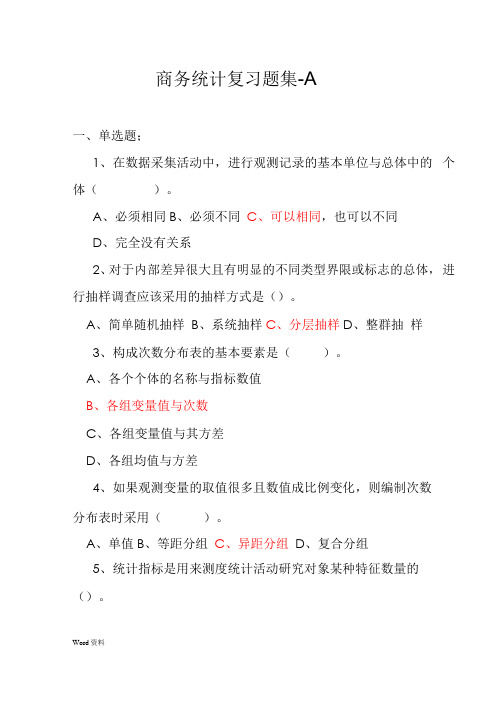
商务统计复习题集-A一、单选题;1、在数据采集活动中,进行观测记录的基本单位与总体中的个体()。
A、必须相同B、必须不同C、可以相同,也可以不同D、完全没有关系2、对于内部差异很大且有明显的不同类型界限或标志的总体,进行抽样调查应该采用的抽样方式是()。
A、简单随机抽样B、系统抽样C、分层抽样D、整群抽样3、构成次数分布表的基本要素是()。
A、各个个体的名称与指标数值B、各组变量值与次数C、各组变量值与其方差D、各组均值与方差4、如果观测变量的取值很多且数值成比例变化,则编制次数分布表时采用()。
A、单值B、等距分组C、异距分组D、复合分组5、统计指标是用来测度统计活动研究对象某种特征数量的()。
Word资料A、概念B、数值C、概念和数值D、数值尺度6、统计指标口径是指统计指标所包括的()。
A、总体大小B、个体多少C、理论范围D、具体范围7、统计推断是一种()。
A、演绎推理B、完全归纳推理C、不完全归纳推理D、非逻辑推理。
8、根据斯特吉斯公式,对于样本容量为1000的一个观测样本,采用等距分组,其组数应该为()。
A、9 组B、10 组C、11 组D、12 组9、从0-1分布总体中进行不放回抽样,样本中具有1值的个体数服从()。
A、两点分布B、二项分布C、超几何分布D、泊松分布10、对于由观测变量的各个分组和各组变量总值顺序排列的分组分布表,计算算术平均数需采用的计算公式为()。
A、简单算术平均数B、加权算术平均数C、简单调和平均数D、加权调和平均数11、随机变量的观测值中出现次数最多的变量值是该变量的()。
A、众数B、中位数C、极值D、均值12、两个观测值之间如果存在同方向的线性函数关系,则二者的相关关系为()。
A、0B、1C、—1D、0.5Word资料13、如果观测变量的算术平均数>中位数>众数,则该观测变量的次数分布是()。
A、左偏分布B、右偏分布C、对称分布D、均匀分布14、对于同一数据,所计算出的平均差与标准差相比,通常有()。

《商务统计》试题选登一、单项选择题下列各题A)、B) C)、D)四个选项中,只有一个选项是正确的。
1.进行全国人口普查,普查总体中的个体是A)每个省的人口B)每个县的人口C)每个家庭的人口D)每个人2.根据人的性别特征将人口划分为男性和女性两类,所采用的测度计量尺度是A)名义尺度B)顺序尺度C)差距尺度D)比例尺度3.某市场调查公司为了对一家大型商场做顾客满意度调查,对不同性别和年龄的顾客按事先规定的人数随意进行了一些调查询问,这种调查属于A)任意调查B)立意调查C)配额抽样D)整群抽样4.利用拉丁方来安排试验观测,所需要考虑的因素只能为A)2个B)3个C)4个D)5个5.从0-1分布总体中进行不放回抽样,样本中具有1值的个体数服从A)两点分布B)二项分布C)超几何分布D)泊松分布6.测度随机变量分布中心最常用的指标是A)算术平均数B)中位数C)众数D)调和平均数7.变量x与y的相关系数的符号取决于A)变量x的标准差B)变最y的标准差C)变量x和y两标准差的乘积D)变量x和y的协方差8.有一个样本容量为10的样本,其均值为1300小时,方差为8175.56。
若按放回抽样计算,则样本均值的标准误是A)28.35 小时B)28.59 小时C)29.61 小时D)30.02 小时9.在关于总体参数的假设检验中,原假设必须是一个A)精确假设B)非精确假设C)复合假设D)备择假设10.如果原假设为H0:eze0,备则假设为乩.。
<。
0,则进行假设检验时应采用A)侧检验B)左侧检验0双侧检验D)上侧检验11.在方差分析中,各次试验观测应A)相互关联B)互不相关C)计量逐步精确D)方法逐步改进12.相关关系是变量之间一种A)线性函数依存关系B)确定性的数量依存关系C)非线性函数依存关系D)非确定性的数量依存关系13.对于回归模型刀=九+8信+邛]=1,2,…,口),为了进行统计推断,通常假定'、u2、…、u n的数学期望J 。
复习题一、单项选择题1.下列数据属于名义尺度(nominal scale)的是()A.性别B) 年龄C)体重D)年级2.下列数据属于名义尺度(nominal scale)数据的是()。
A.性别 B. 年龄 C. 体重 D. 年级3.下列数据属于区间尺度(order scale)数据的是()。
A.气温 B. 产量 C. 体重 D.年级4.针对z-分数(z-score),下列说法不正确的是()。
A. 若z-分数小于0,则变量值小于平均数B. 若z-分数大于0,则变量值大于平均数C. 若z-分数等于0,则变量值等于平均数D. 若z-分数等于0,则变量值等于05.下列选项中,不属于变异指标(measure of variability)的是()A) 平均数B) 极差C) 标准差D) 变异系数6.下列几种分布中,属于离散型随机变量(discrete random variable)的分布的是()。
A. 二项分布B. 泊松分布C.D. 超几何分布7.下列几种常见的分布中,属于连续型随机变量(continuous random variable)的分布的是()。
A. 二项分布B. 泊松分布C. 指数分布D. 超几何分布8.一个特定研究中感兴趣的对象的全体称为()A) 样本(sample) B) 参数(a parameter)C) 统计量(statistic)D) 总体(population)9. 下列不属于描述统计(descriptive statistics)常用形式的是()A) 绘制图形B) 绘制表格C) 计算平均数D) 区间估计10. 下列属于统计推断(statistical inference)内容的是()A) 绘制图形B) 绘制表格C) 计算平均数D) 区间估计11. 下列图形中,不能用于分类数据(categorical data)的是()A)条形图B) 茎叶图C) 柱状图D) 饼状图12. 商务数据的相对频数( relative frequency)之和为()A)1 B) 2 C) 0 D)不确定13. 若偏度=-0.85,则该组数据的分布形态为()A)适度左偏B) 适度右偏C) 对称D) 无法确定14. 若偏度=0.85,则该组数据的分布形态为()A.适度左偏B.适度右偏C.对称D.无法确定15.当总体服从正态分布时,样本均值x 的抽样分布(sampling distribution)服从于( )。
A. t 分布B. 泊松分布C. 指数分布D. 正态分布16.当样本容量足够大时,样本均值x 的抽样分布(sampling distribution)近似服从于( )。
A. 二项分布B. 泊松分布C. 指数分布D. 正态分布17. 对于二项分布(binomial probability distribution),下列说法错误的是( )A) 每次试验只有两种可能的结果 B) 每次试验中“成功”的概率相同C) 每次实验都是相互独立的 D) 随机变量是连续型的18.样本均值的标准误差(standard error)x σ( )。
A. 不可能比总体的标准差大B. 随着样本容量的增加而减小C. 度量了样本均值之间的变异度D. 以上都对19.置信系数(confidence coefficient)为95%的含义是( )。
A. 由所有样本均值x 构造的置信区间中有95%的区间包含总体均值μB. 由所有总体均值μ构造的置信区间中有95%的区间包含样本均值xC. 总体均值μ落入置信区间的概率为95%D. 样本均值x 落入置信区间的概率为95%20.下列选项中可以减小置信区间(confidence interval)的长度的是( )。
A. 减小置信水平B. 增加置信水平C. 增加总体均值D. 增加样本均值21.针对样本容量的计算公式2222/)(E z n σα=,下列说法中最准确的是( )。
A. 根据以前研究中的数据计算总体标准差的一个估计作为σ的估计B. 利用初始样本的样本标准差作为σ的计划值C. 对σ进行判断或最优猜测D. 以上都对22.针对样本容量的计算公式2**22/)1()(E p p z n -=α,下列说法中最准确的是()。
A. 用以前相同或类似的的样本比率来代替B. 利用初始样本的样本比率作为*p 的估计值C. 使用判断或最有猜测作为*p 的估计值D. 以上都对23. 对于有限总体(finite population),样本比率p 的标准误差(standard error) 是( )。
A. 1)1(---=N n N n p p p σB. NN n N p σσ1--= C. n p p p )1(-=σ D. np σσ= 24.当总体标准差已知时,显著水平为α的右尾检验中,拒绝域为( )。
A. ),(),(2/2/+∞--∞ααz zB. ),(),(+∞--∞ααz zC. ),(+∞αzD. ),(/2+∞αz25.当总体标准差已知时,显著水平为α的双尾检验(two-tailed test)中,拒绝域为( )。
A. ),(),(2/2/+∞--∞ααz zB. ),(),(+∞--∞ααz zC. ),(+∞αzD. ),(/2+∞αz26.假设检验(hypothesis tests)的第一步是建立( )。
A. 不拒绝假设和拒绝假设B. 检验统计量C. 原假设和备择假设D. 间接假设27.下列原假设(null hypothesis)和备则假设(alternative hypothesis)中,不正确的是( )。
A. 0100:,:μμμμ<≥H HB. 0100:,:μμμμ>≤H HC.0100:,:μμμμ≠=H HD.0100:,:μμμμ≤>H H28.下列原假设(null hypothesis)和备则假设(alternative hypothesis)中,不正确的是( )。
A. 0100:,:μμμμ<≥H HB. 0100:,:μμμμ≥<H HC.0100:,:μμμμ≠=H HD.0100:,:μμμμ<≤H H29.当总体标准差已知时,显著水平为α的左尾检验中,拒绝域为( )。
A. ),(),(2/2/+∞--∞ααz zB. ),(),(+∞--∞ααz zC. ),(αz -∞D. ),(2/αz -∞30.如果假设检验中显著水平(level of significance)0.05=α, 则犯第二类错误(Type II error)的概率β为( ).A. 2.5%B. 95%C. 97.5%D. 不确定31. 在假设检验中,显著水平10.0=α,检验的p 值=0.05,则应( )A. 不拒绝原假设B. 拒绝原假设C. 接受原假设D. 无法确定32.如果假设检验中显著水平(level of significance)0.05=α, 则犯第二类错误(Type II error)的概率β为( ).A. 2.5%B. 95%C. 97.5%D. 不确定13. 在假设检验中,显著水平05.0=α,检验的p 值=0.01,则应( ) 。
A. 拒绝原假设B. 不拒绝原假设C. 接受原假设D. 无法确定12. 如果假设检验中显著水平0.05=α, 则犯第一类错误的概率为 ( ).A. 5%B. 95% 不确定34.样本容量30<n (sampling distribution)服从于( )。
A. 二项分布B. 泊松分布C. t 分布D. 正态分布35.置信系数(confidence coefficient)为95%的含义是( )。
A. 由所有样本均值x 构造的置信区间中有95%的区间包含总体均值μB. 由所有总体均值μ构造的置信区间中有95%的区间包含样本均值xC. 总体均值μ落入置信区间的概率为95%D. 样本均值x 落入置信区间的概率为95%36.下列选项中可以引起置信区间(confidence interval)的长度增大的是( )。
A. 增大置信水平B. 减小置信水平C. 增加总体均值D. 增加样本均值37.第一类错误(type I error)是指( )A. 拒绝了正确的零假设B. 没有拒绝正确的零假设C. 拒绝了错误的零假设D. 没有拒绝错误零假设38. 在假设检验中,显著水平05.0=α,检验的p 值=0.21,则应( )A. 拒绝原假设B. 不拒绝原假设C. 接受原假设D. 无法确定39.样本均值的标准误差(standard error)x σ( )。
A. 不可能比总体的标准差大B. 随着样本容量的增加而减小C. 度量了样本均值之间的变异度D. 以上都对40. 常用的估计方法有( )。
A. 点估计(point estimate)与区间估计(interval estimate)B. 点估计与无偏估计(unbiased estimate)C. 区间估计与无偏估计D. 区间估计与边际估计(margin estimate)41.置信系数(confidence coefficient)为95%的含义是( )。
A. 由所有样本均值x 构造的置信区间中有95%的区间包含总体均值μB. 由所有总体均值μ构造的置信区间中有95%的区间包含样本均值xC. 总体均值μ落入置信区间的概率为95%D. 样本均值x 落入置信区间的概率为95%42.利用样本数据求回归方程估计式的方法是( )。
A. 假设检验B. 估计C. 最小二乘法D. 抽样42.给定回归方程x b b y 10+=, 斜率1b 表示( )。
A. 0=x 时y 的预测值B. x 每变化一个单位,y 的平均变化值C. y 的预测值D. 样本回归直线的变异度44. 若变量x 与y 的回归方程为x y 2.0300+=,则x 与y 呈( )A. 正相关B. 负相关C. 不相关D. 不确定45. 若变量x 与y 的回归方程为x y 6.0-002=,则x 与y 呈( ) A. 正相关 B. 负相关 C. 不相关 D. 不确定46.相关系数r 的取值范围为( )。
A. [-1,1]B. [0,1]C. (-∞,+∞)D. 不确定47. 给定回归方程x b b y 10+=, 常数0b 表示( )A. 0=x 时y 的预测值B. x 每变化一个单位y 的平均变化值C. y 的预测值D. 样本回归直线的变异度二、判断题1. 气温数据属于比例尺度(ratio scale)的数据。
( )2. 方差(variance)的单位与原始数据的单位是一致的。
( )3. 指数分布的期望(expected value)与方差(variance)是相等的。
( )4. 如果P(AB) =P(A)P(B) ,则事件A 与B 互斥。